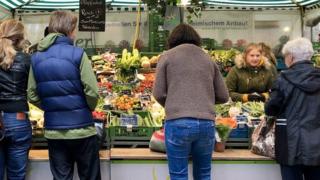New political climate may boost European Greens
Are Europe’s Green parties benefiting from a Greta Thunberg effect?
The Fridays for Future environmental protests, championed by the teenage Swedish activist, have put climate change concerns centre-stage, days away from the European elections.
The UK and Ireland have both declared a “climate emergency”, responding to the protests.
Last year saw Green parties win big in German local elections, where there is talk of a “Green wave”.
So will all this help Europe’s Green parties in the vote?
Munich, Germany
Henrike Hahn, the German Green Party’s top candidate in Bavaria, looked confident campaigning at a farmers’ market in Munich.
“Our core message is courage instead of fear,” she said.
In Bavaria the Greens are riding high. In state elections last year, they surged into second place with over 17% and they hope for a similar result in the EU elections.
“The Conservative CSU Party in Bavaria, which has been in power for decades, was focusing on anti-European politics and anti-refugee feeling,” she said.
“We realised people don’t want to be scared. They want political content. And what we focus on is, of course, strong policies on climate issues, on environmental protection, but also core values like pro-European humanity and solidarity with refugees.”
At the farmer’s market, the Green message seemed to go down well.
“I’m really disappointed with the established parties,” one man said. “For once, I may make an exception and vote Green.”
Lore Becker, a pensioner who teaches English, said Green policies represented the future.
“I think they’re absolutely important for all of Europe, not only Germany. The Greens, it seems to me, are a party of the younger generation and not only the old topics that we are a little bit tired of.”
But some Germans see the Greens as puritanical.
Daniel Günther, the conservative Prime Minister of Schleswig-Holstein in the north, told German daily Die Zeit: “Those who try to regiment everything in life: no motor racing, or better still, no cars at all, no more fast food – they also diminish the joy of life. And some Greens go too far in that direction.”
Read more on the European elections:
Vienna, Austria
Over the border in Austria, the Green Party is struggling to make a comeback after it failed to cross the 4% threshold and crashed out of parliament in the 2017 general election.
Political analyst Thomas Hofer said it had been brought down by “a lot of internal quarrels, one party branch against the other”.
“This really destroyed their chances of getting back into parliament. Of course, this was also due to a hostile environment because, back in 2017, there was one overarching issue, migration, and the Greens were perceived as being too lenient on that,” he said.
But Mr Hofer believes the Greens can stage a comeback in the EU elections, and score around 8–9%.
“I think there are a lot of former Green voters who regret that they went away in 2017. I’m pretty sure that the Greens won’t keep their great result from 2014, but I think they will come in the high single digits.”
The Greens have enlisted a celebrity chef, Sarah Wiener, as one of their candidates.
At a campaign event, Dagmar, from Vienna, considered the Greens to be the only party with a global outlook.
“It’s important for Europe, I think. They care for global health because we can’t do immigration, we can’t do financial things, social things, without being supported by what we live from: plants, animals, water.
“If you have children, you have to think about that.”
Padua, Italy
A little further south, in Italy, the picture is very different. A coalition called Europa Verde is polling at about 1%.
In Padua I met Giovanni, a student of ecology. He says political support for Green issues is very weak in Italy.
“I think people here love the landscape, which is very beautiful, and they want to preserve it, but maybe they don’t know how.
“We are getting a little distracted with other things.”
He says education and media coverage are very important and thinks Fridays for Future is having an effect.
“Now there is Greta Thunberg, so maybe this issue is having a little bit more visibility now than some years before.”
Source: Read Full Article



